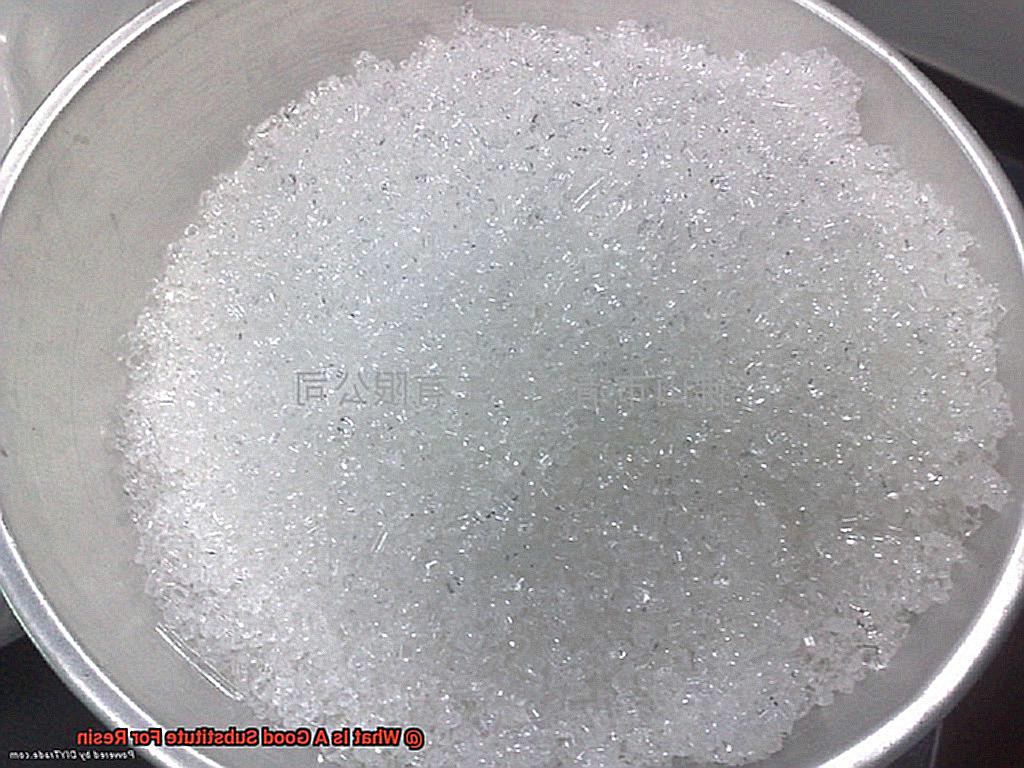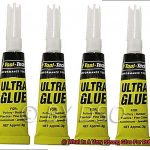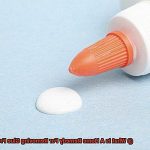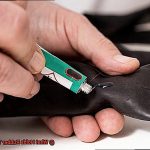Crafters, woodworkers, and industrial manufacturers have long relied on resin for its versatility. But what if resin doesn’t quite fit the bill? Fear not, my fellow creators. There are incredible substitutes out there ready to take center stage.
In this blog post, we’ll explore the qualities that define a great resin substitute and introduce you to some compelling options that can fill the void with ease. While resin undeniably has its unique charm, these alternatives offer similar benefits while bringing their own special advantages to the table. We’ll discuss the pros and cons of each substitute, guiding you towards an informed decision for your next project.
When searching for a substitute, it’s crucial to consider your project’s purpose. Whether you’re crafting delicate jewelry or designing custom furniture, finding the perfect alternative is key. Compatibility, durability, and user-friendliness should top your checklist when seeking a material that guarantees success.
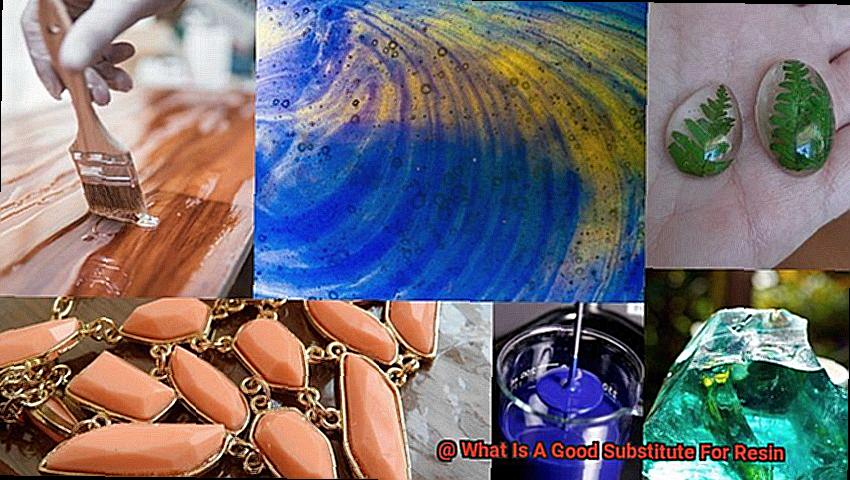
While each substitute has its merits, it’s important to acknowledge that trade-offs may exist compared to resin. However, these alternatives possess unique qualities that make them effective choices for various projects. By exploring a wide range of options, you’ll uncover exciting materials tailored to your specific needs, along with innovative techniques waiting to be discovered.
Join us on this journey into the world of resin substitutes as we dive headfirst into mesmerizing materials that will expand your artistic horizons. Together, let’s uncover hidden gems offering exceptional alternatives to resin without compromising the quality of your masterpieces.
What is Epoxy and How Does it Compare to Resin?
Contents
- 1 What is Epoxy and How Does it Compare to Resin?
- 2 The Benefits of Using Polyurethane as a Substitute for Resin
- 3 Cyanoacrylate Glue (Super Glue)
- 4 Advantages and Disadvantages of Choosing Alternatives to Resin
- 5 Tips on Selecting the Right Substitute for Your Project
- 6 Common Applications for Epoxy, Polyurethane, and Super Glue
- 7 How to Use Epoxy, Polyurethane, and Super Glue in Place of Resin
- 8 Safety Precautions When Working with Alternatives to Resin
- 9 Conclusion
Epoxy and resin are materials commonly used in various applications, but they have distinct differences. Epoxy is an adhesive composed of two parts: resin and hardener. When mixed, they undergo a chemical reaction, resulting in a strong adhesive. Resin, on the other hand, is a viscous substance used for casting, coating, or molding.
Firstly, their chemical composition sets them apart. Epoxy consists of cross-linked polymer molecules that provide strength and durability. Resin, however, remains in a liquid or semi-solid state even after curing, without undergoing cross-linking reactions.
Their usage differs as well. Epoxy is widely used in construction, woodworking, and automotive industries due to its bonding properties and resistance to chemicals, heat, and moisture. It fills gaps, repairs structures, and bonds surfaces. Resin finds its place in artistic projects, such as jewelry making and sculptures. It also works well for coating surfaces like countertops or tabletops to create a glossy finish.
In terms of physical properties, epoxy exhibits higher strength and hardness compared to resin. It withstands heavy loads and impacts without cracking easily. Additionally, it has better resistance to chemicals and high temperatures. Resin is more flexible and less brittle than epoxy, offering flexibility and impact resistance.
Cost-wise, epoxy is generally more expensive due to its superior performance and versatility. Its manufacturing process involves complex chemistry and quality control. In contrast, resin is relatively more affordable for artistic and hobbyist applications.
To summarize, epoxy and resin are distinct materials with different chemical compositions, applications, and properties. Epoxy excels in strength and durability for industrial use, while resin finds its niche in artistic projects. Understanding these differences helps determine the most suitable material for specific projects or applications.
As for alternatives to resin:
- Polyurethane offers excellent resistance to abrasion, UV rays, and moisture.
- Cyanoacrylate Glue (Super Glue) forms a strong bond quickly.
- Silicone is known for flexibility, heat resistance, and water repellency.
- Acrylic provides clarity and transparency.
The Benefits of Using Polyurethane as a Substitute for Resin
Polyurethane, a versatile material, has emerged as an exceptional substitute for resin in glue applications. Its numerous benefits make it an attractive choice for professionals and hobbyists alike. Let’s delve into the advantages that make polyurethane stand out from resin.
First and foremost, polyurethane boasts remarkable strength and durability. It can withstand heavy loads and is renowned for its resistance to wear and tear. This makes it ideal for projects that demand long-lasting strength, ensuring that your creations endure the test of time.
Flexibility is another key feature of polyurethane. Unlike resin, which can crack or break under pressure, polyurethane bends and twists without compromising its structural integrity. Woodworkers and furniture makers particularly appreciate this attribute, as it allows them to create flexible and resilient pieces.
When it comes to water and moisture resistance, polyurethane outshines resin. Resin is susceptible to moisture damage, whereas polyurethane demonstrates superior resistance to water. This means that it can be confidently used in outdoor applications without the risk of degradation. Moreover, polyurethane withstands exposure to various chemicals, making it an ideal choice for projects that require chemical resistance.
The aesthetic possibilities of polyurethane are limitless. This material can be easily colored and finished to achieve different effects. Whether you prefer a painted, stained, or clear coat finish, polyurethane allows for customization and personalization like no other.
Time is of the essence in many projects, and that’s where polyurethane shines. With its faster curing time compared to resin, polyurethane dries and hardens relatively quickly. This means faster project completion, saving you valuable time and allowing you to meet tight deadlines.
Cost-effectiveness is also a noteworthy advantage of using polyurethane as a substitute for resin. Polyurethane is generally more affordable while offering similar performance qualities. This makes it an attractive option for professionals working on a budget or hobbyists looking to save some money without compromising on quality.
Finally, polyurethane is considered more environmentally friendly than resin. It is free from harmful chemicals such as volatile organic compounds (VOCs), ensuring a safer and greener option for both users and the environment.
Cyanoacrylate Glue (Super Glue)
Cyanoacrylate glue, also known as super glue, is a versatile adhesive that finds its application in various industries and for various purposes. It is a fast-acting adhesive that forms an incredibly strong bond between different materials, including plastic, metal, wood, and ceramic. The glue typically comes in liquid form and is transparent or translucent, allowing for seamless bonding.
One of the key advantages of cyanoacrylate glue is its quick drying time. Bonds are achieved within seconds to minutes, making it ideal for projects that require immediate results. This adhesive works by reacting with the moisture present on the surfaces being bonded. This reaction causes the glue to polymerize and create a powerful bond.
Another advantage of cyanoacrylate glue is its exceptional resistance to temperature changes, chemicals, and moisture. This property makes it suitable for a wide range of applications, from household repairs to crafting projects. It can even be used in medical applications, such as closing wounds.
However, it’s important to note that while cyanoacrylate glue is a great adhesive option for many situations, it may not be the ideal substitute for resin in all cases. Resin offers unique characteristics like transparency, flexibility, and the ability to encapsulate objects. If the goal is to achieve a glossy, transparent finish or to preserve delicate items within a clear protective layer, cyanoacrylate glue may not be the best substitute for resin.
Advantages and Disadvantages of Choosing Alternatives to Resin
When it comes to alternatives to resin, there are several advantages and disadvantages to consider. Let’s delve into these factors to help you make an informed decision for your next project.
Firstly, cost-effectiveness is a major advantage of choosing alternatives to resin. Resin can be quite pricey, especially for larger projects or frequent use. Opting for alternatives like glue or epoxy can offer a more affordable solution without compromising on quality.
Secondly, availability is another advantage of alternatives. While resin may not be readily accessible in all areas, glues and epoxies are commonly found in hardware stores and online. This makes them easily obtainable for individuals who may not have easy access to specialized resin suppliers.
Drying time is also an important consideration. Resin often requires hours or even days to fully cure, which can be inconvenient for those who need quick results. On the other hand, many glues and epoxies dry relatively quickly, allowing for faster project completion.
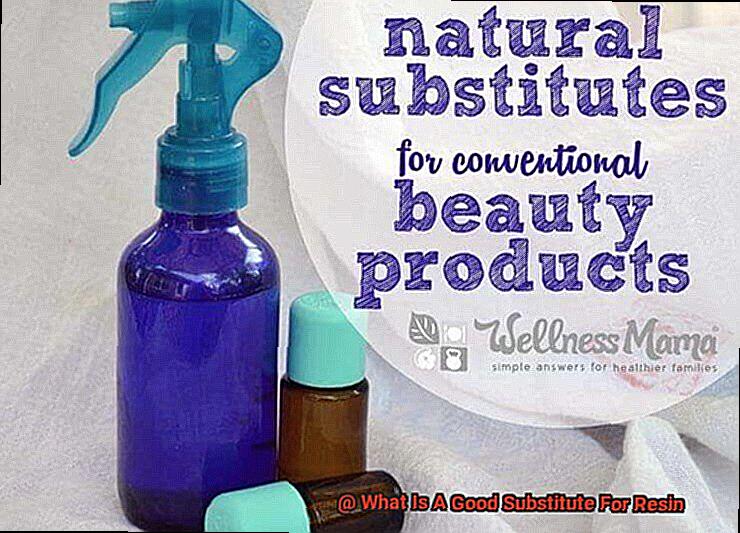
Versatility is another key advantage of alternatives to resin. While resin is commonly used for casting or coating purposes, glues and epoxies can be used for various types of bonding, repairs, or artistic projects. This versatility allows individuals to explore different creative possibilities with their chosen alternative.
Strength and durability are crucial factors when selecting an alternative. Resin is renowned for its exceptional strength and durability once fully cured. However, certain alternatives like epoxy can offer similar levels of strength and durability, making them suitable substitutes for specific applications.
Toxicity and safety should also be taken into account. Resin can emit harmful fumes during the curing process, requiring proper ventilation and safety precautions. In contrast, some alternatives like certain types of glue may have lower toxicity levels or may not emit fumes at all. This makes them a safer option for individuals who are sensitive to strong odors or have concerns about working with potentially harmful substances.
Appearance and finish are important factors to consider as well. Resin is often chosen for its glossy and smooth finish, which can enhance the overall appearance of a project. While alternatives like glue or epoxy may not offer the exact same finish, they can still provide satisfactory results depending on the desired aesthetic.
Learning curve is another aspect to keep in mind. Working with resin can require expertise and knowledge to achieve desired results. Alternatives like glue or epoxy may have a shorter learning curve, making them more accessible for beginners or individuals who are new to crafting or DIY projects.
Longevity is an important consideration as well. Resin is known for its long-lasting properties, providing a durable finish that can withstand various environmental conditions. While alternatives may offer similar strength and durability, it is crucial to consider their longevity and how well they will hold up over time. Some alternatives may require additional maintenance or may not have the same lifespan as resin.
Lastly, aesthetics play a significant role in choosing an alternative to resin. Resin provides a unique and distinct appearance that may not be easily replicated by other alternatives. If aesthetics are a crucial factor in your project, it is advisable to carefully evaluate whether the chosen alternative can achieve the desired visual outcome.
Tips on Selecting the Right Substitute for Your Project
When it comes to selecting the perfect substitute for resin in your project, there are a multitude of factors that should be taken into consideration. The first and most crucial factor to ponder is the purpose of resin in your project. Are you seeking the adhesive properties that resin provides, or are you more concerned with achieving a glossy, smooth finish?
If you require a substitute that offers adhesive properties similar to resin, epoxy is an excellent option to consider. Known for its versatility and robust bonding capabilities, epoxy can effectively join various materials together. This adhesive is commonly utilized in woodworking projects and within the construction industry due to its durability and long-lasting bond.
Polyurethane is another alternative worth exploring if you are in search of a substitute for resin’s adhesive qualities. This type of adhesive boasts exceptional bonding strength and versatility. Whether you’re working with wood, metal, plastic, or even fabric, polyurethane can securely bond the surfaces together. Additionally, polyurethane adhesives showcase remarkable resistance to water and chemicals, making them suitable for both indoor and outdoor applications.
If your main focus is finding a substitute that replicates the glossy finish provided by resin, there are several options available. One popular choice is varnish. Acting as a transparent coating, varnish can provide surfaces with a glossy and protective finish. Commonly used on wood furniture, floors, and artwork, varnish offers different levels of sheen ranging from matte to high gloss, allowing you to achieve your desired level of shine.
Lacquer is another substitute that can help you attain the glossy finish characteristic of resin. This clear coating is renowned for providing surfaces such as wood, metal, and certain plastics with a high-gloss finish. With its quick drying time and exceptional durability, lacquer is often utilized in furniture refinishing and automotive applications.
When selecting a substitute for resin, it’s vital to consider the specific requirements of your project. Factors such as the materials you’re working with, the intended use of your finished product, and the level of durability and resistance required should all be taken into account. Furthermore, it’s always prudent to conduct a small test on an inconspicuous area before committing to using the substitute material for your entire project.
Common Applications for Epoxy, Polyurethane, and Super Glue
Epoxy, polyurethane, and super glue are three adhesive superheroes that come to the rescue in a variety of applications. Let me take you on a journey through their common uses.
First up is epoxy, the construction conqueror. With its mighty strength and versatility, epoxy is the go-to adhesive for builders and craftsmen alike. It fearlessly bonds materials like wood, metal, concrete, and fiberglass, filling cracks and repairing damaged surfaces with ease.
In the automotive world, epoxy takes on the role of a repair hero, fixing engine parts, plastics, and fiberglass components. Its electrical prowess shines as it encapsulates circuit boards and bonds wires in electronic systems. And let’s not forget its artistic side – epoxy resins are beloved by artists for casting molds, creating jewelry, and coating artwork with a glossy finish.
Next in line is polyurethane, the woodworking warrior. This adhesive champion fearlessly joins different types of wood together with unmatched security. Furniture pieces are united, surfaces are laminated, and wooden structures are repaired under polyurethane’s watchful eye.
But its talents don’t stop there – polyurethane is also a construction crusader. It bonds concrete, stone, metal, and plastic with unwavering strength. Floors are installed, insulation panels are attached, and joints or gaps are sealed under its command. In the automotive realm, polyurethane works tirelessly to bond panels, trim, and glass together while reducing noise and vibrations. And when it comes to footwear and upholstery, polyurethane leaps into action, ensuring a strong bond between leather, fabric, and foam.
Last but not least is super glue, the adhesive Avenger that comes to the rescue in everyday situations. With lightning-fast curing time and immense strength, super glue is the savior of household repairs.
Broken ceramic or glass objects are mended effortlessly. Loose hinges or handles are fixed in a flash. And small cracks in various materials are sealed with precision.
In the world of crafts, super glue is a trusted companion, bonding different materials quickly and securely. Models are assembled, jewelry pieces are crafted, and embellishments are secured onto surfaces with finesse. But super glue’s powers extend beyond the realm of DIY – it has found its way into the medical field as a quick adhesive for closing minor wounds or incisions. And in electronics repairs, super glue works its magic, bonding small components and fixing loose connections in a flash.
How to Use Epoxy, Polyurethane, and Super Glue in Place of Resin
Using epoxy, polyurethane, and super glue as substitutes for resin requires careful consideration of the specific requirements of your project. Each adhesive has its own strengths and limitations, so it is crucial to choose the right adhesive for your particular application.
Before using any adhesive, it is essential to properly prepare the surfaces to be bonded. This may involve cleaning the surfaces with a solvent to remove any dirt or contaminants or sanding them to create a rough texture for better adhesion.
When applying epoxy, polyurethane, or super glue, it is recommended to follow the manufacturer’s instructions carefully. This includes mixing ratios, curing times, and any safety precautions. Adhesives should be applied evenly and in the appropriate amount to ensure a strong bond.
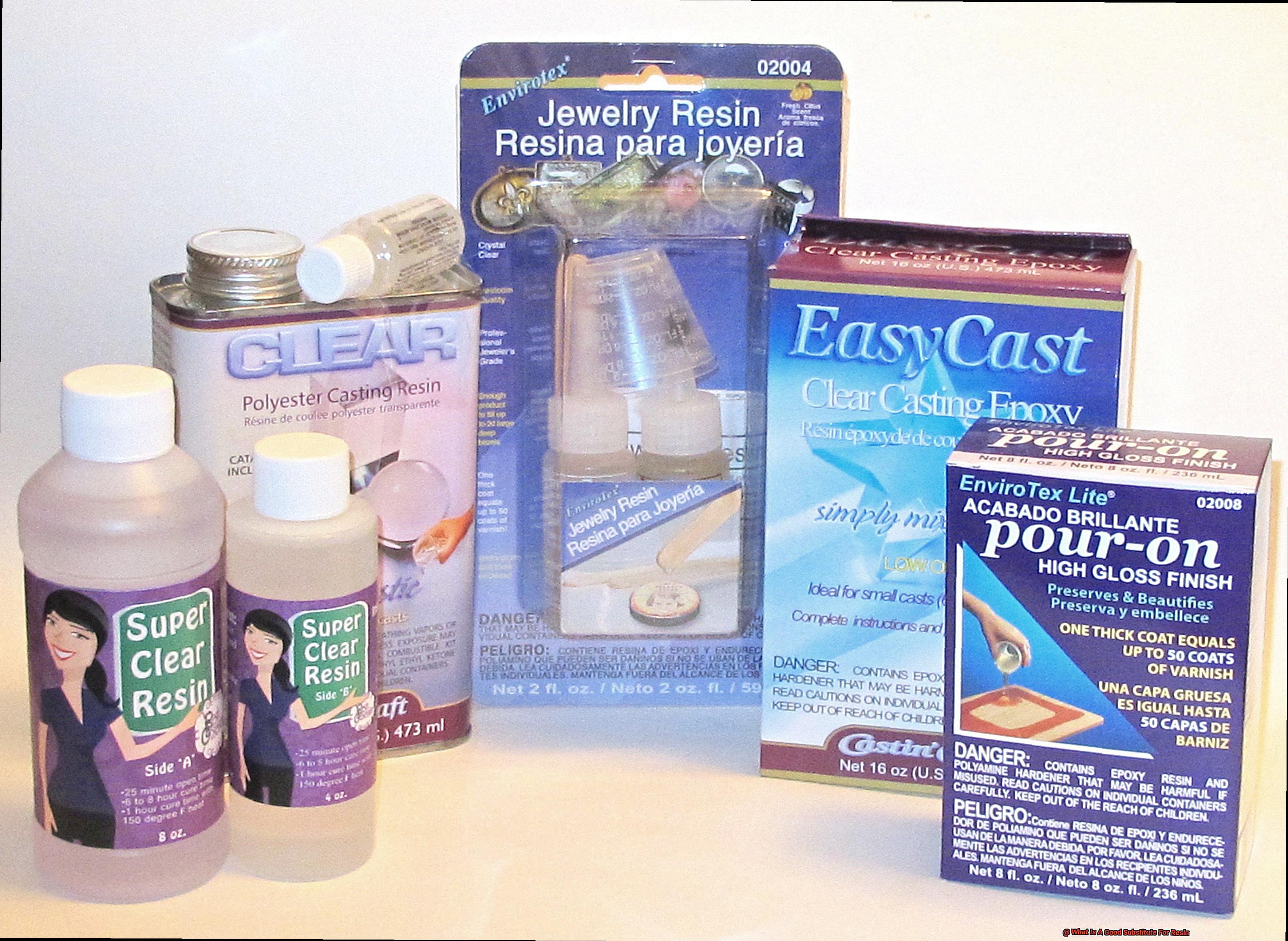
It is also important to consider the drying and curing times of the adhesive. Some adhesives may require longer curing times than others, so patience is necessary to allow the adhesive to fully set and achieve its maximum strength.
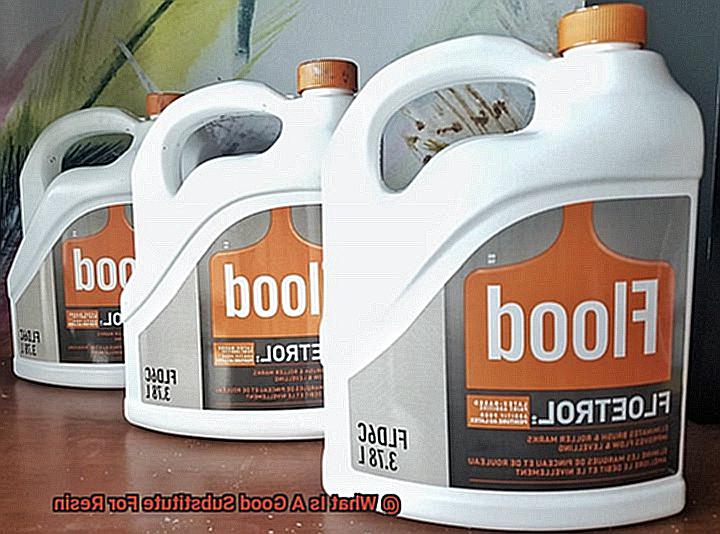
While epoxy, polyurethane, and super glue can be used as substitutes for resin in certain applications, they may not always provide the same level of clarity or translucency. If your project requires a clear or transparent finish, resin may still be the best option.
Safety Precautions When Working with Alternatives to Resin
When working with alternatives to resin, prioritizing safety precautions is crucial to protect yourself and those around you. These alternatives may offer similar properties and functionalities to resin, but they may also come with their own set of risks and hazards. By following these safety precautions, you can minimize potential dangers and ensure a safe working environment.
Read and follow product instructions:
- Carefully read and understand the manufacturer’s instructions.
- Follow guidelines on how to safely handle, mix, and use the alternative to resin.
- Prevent accidents or mishaps by adhering to these guidelines.
Wear appropriate personal protective equipment (PPE):
- Consider wearing gloves, safety glasses or goggles, a respirator or mask (if required), and protective clothing.
- Protect yourself from potential skin irritations, eye injuries, inhalation of hazardous substances, and other physical harm.
Work in a well-ventilated area:
- Choose a well-ventilated area with open windows or use exhaust fans for proper air circulation.
- Minimize exposure to harmful fumes or vapors emitted by alternatives to resin.
- Working outdoors further reduces the concentration of fumes.
Avoid direct skin contact:

- Prevent skin irritations or allergic reactions by wearing gloves and long sleeves.
- In case of accidental contact, wash the affected area thoroughly with soap and water.
- Seek medical attention if irritation persists or worsens.
Dispose of waste properly:
- Follow local regulations for disposing of unused alternative materials, contaminated tools, and other waste generated during the process.
- Do not pour leftover liquids or chemicals down the drain unless instructed by the manufacturer or local authorities.
Store alternatives properly:
- Store alternative materials in a cool, dry place away from direct sunlight, heat sources, and incompatible substances.
- Improper storage can lead to chemical reactions, product degradation, or accidents.
- Keep alternative materials out of reach of children and pets.
Educate yourself on emergency procedures:
- Familiarize yourself with emergency procedures specific to the alternative material you are using.
- Keep appropriate fire extinguishers, first aid kits, and emergency contact numbers readily available.
IxoyB8ViBnQ” >
Conclusion
When it comes to finding a suitable alternative to resin, there are a few options worth considering.
One viable substitute is epoxy, which shares similar properties and can be used in various applications. Another option is polyurethane, known for its durability and versatility.
Additionally, certain types of clay or plaster can be used as substitutes for resin in art and craft projects.

